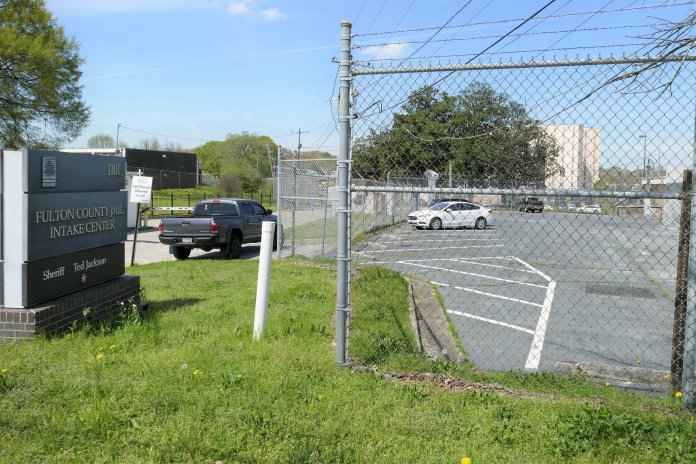
Georgia Jailers Cope With COVID-19; Release Inmates, Quarantine Arrivals
Georgia Jailers Cope With COVID-19; Release Inmates, Quarantine Arrivals
By Stanley Dunlap | Georgia Recorder | March 30, 2020
Other Pages
Updated March 30 to include a response from the Gwinnett County Sheriff.
The Dougherty County detention center is a little more than a mile away from Albany’s Phoebe Putney Memorial Hospital where medical staffers are on the front line of Georgia’s battle against the COVID-19 outbreak.
It is one of many jails in the state where local law enforcement is taking a second look at releasing offenders who they’d usually keep locked up in an effort to allow more space for inmates to distance among themselves. County jails and state prisons are under increasing scrutiny from civil rights groups in Georgia that want to ensure people in captivity are protected from dangers posed by the sometimes deadly disease caused by the highly contagious coronavirus.
State health officials reported that by Sunday evening, 247 people in Dougherty County had tested positive for COVID-19, the third highest number in the state, overwhelming the county’s main hospital.
Dougherty’s jail population is down from 600 inmates to about 515, according to chief jailer John Ostrander. That 15% reduction came from relaxing some rules, working with the Department of Community Supervision to temporarily drop warrants for people with probation reporting violations or failed drug tests.
Offenders locked up for relatively minor charges like disorderly conduct to driving with a suspended license are candidates for release and the people newly arrested for those kinds of crimes are often not booked into the detention center, Ostrander said.
Ostrander created a separate housing pod and instituted automatic testing of anyone exhibiting COVID-19 symptoms like consistent coughing, shortness of breath or a temperature over 100.4 degrees.
“Everybody has their own piece of the puzzle and for us at the jail obviously our primary goal is to guard the general inmate population in every way that we can,” he said. “I believe that our general population in the Dougherty County jail is the single most protected group in the county.”
Georgia’s locally run jails hold about 38,000 people on a given day and about 52,000 convicted felons are held in state prisons.
Many jailers report adopting new stringent disinfectant measures to contain the coronavirus spread, limiting access to prisoners by suspending visitation, and practicing other public health precautions such as frequent hand washing and taking new inmates’ temperatures.
An outbreak at Lee State Prison near Albany resulted in the death of an inmate last week and sent three other inmates and a staffer to the hospital. Across the state, other law enforcement employees and inmates tested positive, including a DeKalb County regional youth detention staffer as well as a Fulton County inmate.
The American Civil Liberties Union of Georgia and Southern Center for Human Rights are asking Georgia’s sheriffs to lower the jail population as Dougherty County is doing. They call for the release of many low-risk offenders and people who are most vulnerable due to age or poor health. And they are pressing jailers to follow other public health recommendations to mitigate the risk of infection.
The ACLU said in a statement last week it is disappointed that the Gwinnett County Sheriff’s Office isn’t releasing more people accused of minor offenses from its jail. It is also monitoring the Cobb County Sheriff’s Office, where several detention center employees are now in self-quarantine after one of their co-workers tested positive for COVID-19.
By Sunday evening, state health officials confirmed 2,683 positive tests for COVID-19 in Georgia, including cases in the four largest Atlanta area counties ranging from 145 in Gwinnett to 425 in Fulton.
“Gwinnett County should release individuals who are low-level offenders or who are incarcerated awaiting trial because of an inability to pay cash bail or in custody due to an inability to pay fines and fees,” said Christopher Bruce, political director of the ACLU of Georgia. “Putting people at risk by keeping people in jails beyond what is necessary not only is immoral but also poses a far-reaching health threat to the greater community.”
A Gwinnett sheriff’s spokeswoman said that the release of inmates is decided by the courts and that its staff is working to expand the ability for inmates to access the court by video services.
The Cobb sheriff’s department did not respond to messages left by the Georgia Recorder on Friday.
In Fulton County, one inmate tested positive last week. Fulton jailers are using touchless thermometers for the first time to screen people for fevers at intake. And Fulton’s sheriff granted more than 30 inmates an early release to limit overcrowding.
Bibb County Sheriff David Davis said his office is already following some of the requests from groups like the ACLU and Southern Center for Human Rights.
Inside the Macon jail, staff is reminded frequently to wash hands and use hand sanitizers. The jail population is down to about 837 inmates from 900 a few weeks ago after letting out inmates facing nonviolent charges with health conditions that make them more vulnerable to the coronavirus.
That includes releasing some inmates with heart ailments or health complications related to diabetes, Davis said.
One section of Bibb County’s jail is sectioned off as a quarantine area so that inmates exhibiting symptoms can be isolated.
“We have had other situations similar to this, you have a flu outbreak in your facility you have to do those isolation techniques,” Davis said. “The baseline plans are already in place for facilities like this. While this is a unique and communicable disease, there’s other things that can get into a jail that are just as contagious and create problems in a tight confined place.”
Sheriffs across the state are also taking extra precautions to try to limit the exposure to ensure the safety of jailers and other staff, said said Terry Norris, executive director of the Georgia Sheriffs’ Association.
“It’s very difficult, if not impossible, to completely social distance all the deputies and certainly jailers to have that distance we need because they come in contact with the public,” Norris said. “Protecting that limited workforce is vital for us."

Jailers from Albany to north Georgia are releasing minor offenders early as part of an effort to limit the coronavirus spread in local lockups. The Fulton County Sheriff is checking temperatures of new arrivals at the jail and has released more than 30 inmates.
John McCosh/Georgia Recorder
Related content

